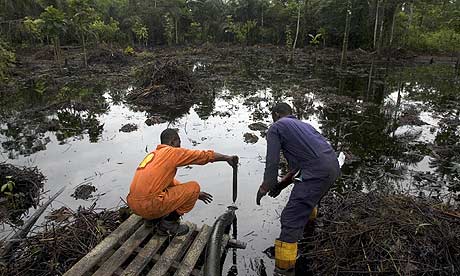Without controversy, the recent rebuff by a British court of attempt by some communities in the Niger Delta to sue oil giant, Shell, for allegedly polluting their fishing waters and farmlands has again brought to the front burner the high level devastation in the region caused by oil spill.
The high court has ruled that tens of thousands of Nigerians affected by oil pollution cannot proceed with a legal challenge in the United Kingdom against Shell and its Nigerian subsidiary. It decided that the case against the Netherlands-based company should be heard in Nigeria instead.
The two affected communities Ogale and Bille, claim that decades of oil spills have destroyed their homes. They wanted their case heard in the UK but the High Court in London agreed with Shell’s argument that the case, affecting more than 40,000 people, should be heard by local courts in Nigeria, insisting that the parent company has no responsibility for its Nigerian subsidiary.
At the face value, the decision by the court sounds convincing especially as the pollution took place in Nigeria but on a second look, it touches on an issue, which has far-reaching consequences in law and the polity.
In seeking for justice offshore, the villagers have repeatedly said they will not get a fair hearing in Nigeria, which to any right thinking citizen is a big blow to the Nigerian judicial system. With the mind of the communities already polluted by the spill and doubtful sense of justice in the country, where does their fate lie? One is wont to ask.
The case in question involved two claims by more than 2,000 fishermen in southern Bille kingdom and another 40,000 people from the Ogale community in Ogoniland. The communities have witnessed multiple oil spills that have seeped into their water, making it unsafe for use. The majority of the communities rely on fishing and farming for their livelihood.
Oil pollution in the already emasculated region of Niger Delta is a major cause for concern and requires a more committed effort to address.
In 2011, the United Nations Environment Program (UNEP) documented environmental damages caused by oil spills in Ogoniland. The research concluded that groundwater contamination in the community was 450 times above the legal limit.
Amnesty International said it carried out a follow-up investigation in 2015 after Shell claimed it had cleaned up the areas and still found ongoing pollution in the affected communities.
According to the UNEP report, devastating oil spills in the Niger Delta over the past five decades will cost one billion dollars to rectify and take up to 30 years to clean up. UNEP said recently that Shell and other oil firms systematically contaminated a 1,000 sq km area of Ogoniland in the Niger Delta, with disastrous consequences for human health and wildlife.
Nigerians living in the Niger Delta have obviously paid a huge price for the economic growth brought by the oil industry while the benefits of oil revenue are still far-fetched. It is appalling that several Niger Delta communities still have no electricity and other basic social amenities, while the oil keeps spilling and the oil majors smile to the bank.
On 10 November 1995, environmental and human rights activist Ken Saro-Wiwa and eight community leaders were executed by the Nigerian state. Ken Saro-Wiwa was leading a protest movement against the ecological disaster that oil production had caused in their homeland, Ogoniland. At the time, Amnesty International described their trial as “politically-motivated and grossly unfair”. 20 years later, communities in Ogoniland continue to suffer the consequences of Shell’s oil spills. Between July and September 2015, people in Ogoniland told Amnesty International how oil spills, and Shell’s failure to clean up devastated their farms, damaged their health and left them with bleak prospects for the future.
The indigenes have severally lamented that their crops and fish are dying from pollution.
Beyond the court case in London and other legal technicalities, we believe that Royal Dutch Shell has profited from the Niger Delta region and should live up to the responsibility of addressing the plight of the indigenes.
The Nigerian government must also ensure that aggrieved citizens get justice in their land to stem needless restiveness.
